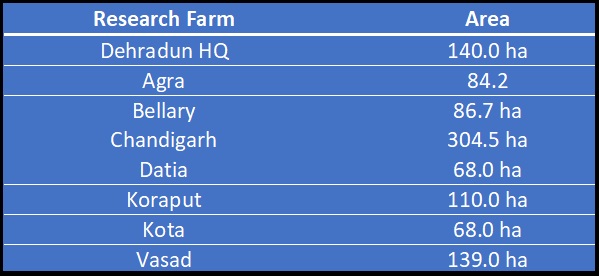

India was among the first few countries to have taken timely cognizance of the problem of soil erosion. Realizing that soil and water conservation is the only known way to protect our lands, a chain of Soil Conservation Research, Demonstration and Training Centres were established by the Govt. of India during I and II Five Year Plans (1954-57). These Centres were later transferred to the Indian Council of Agricultural Research (ICAR) on October 01, 1967. The ICAR combined these Research Centres and established on April 01, 1974, the Central Soil and Water Conservation Research and Training Institute (CSWCRTI) with the headquarters at Dehra Dun.

CSWCRTI with its headquarters at Dehradun and eight Research Centres spread over the country is a premier research institution catering to research, training and extension needs in the field of natural resource management for the past six decades. The research activities of this institute is focused on addressing current national priorities and changing international scenario along with micro-level problems directly affecting the livelihood of rural community dependent on agriculture. In this process, the institute has developed several area specific technologies for soil and water conservation, water resource development, crop diversification and integrated farming systems. The institute has been a pioneer in popularizing the watershed concept of natural resource management through several operational watershed projects, since 1974, the pride of them being the Sukhomajri in Haryana state of India which is considered to be the mother of all projects on participatory integrated watershed management, in India. Also, interdisciplinary groups of scientists have been working on critical issues like assessment of soil erosion and its impact on crop productivity, development of soil and water conservation technologies for arable and non-arable lands, ground water recharge and water harvesting, bio-engineering measures for mass erosion problems, socio-economic dimensions of watershed management, etc. in different regions of India. Environmental benefits of land degradation control, alternative land use systems and management of common property resources have been largely emphasized in various research projects of the institute. The outcome of these research activities help in formulating strategies and policies not only for sustainable management of natural resources in the country but also mitigating the impact of future climate change. The institute also provides consultancies and collaborates with national and international institutions engaged in the field of soil and water conservation and watershed management.
CSWCRTI is a unique kind of institution and engaged not only in Research and Extension in the field of soil and water conservation and watershed management but also in Human Resource Development of different stakeholders through conducting capacity building and skill development programmes by well trained and multi-diciplinary team of Scientists and Technicians. Institute conducts its regular training programme every year at the national level for gazetted and non-gazetted officers hailed from different government departments and other agencies. Also, need based capacity building and skill development have been addressed through organizing numerous short term training programmes (tailor made short courses) as and when required by different agencies engaged in natural resource management in the country.
The main Institute at Dehradun is having satellite research centres at Agra, Bellary, Chandigarh, Datia, Koraput, Kota, Vasad and Udhagamanadalam in different agro-ecological regions. There is a huge asset base of 1210 ha farm land and office campuses with sanctioned cadre strength of 129 Scientists, 182 technicians, 86 administrative and 226 supporting staff. There are four divisions at the Hqrs., Dehradun which function under the control of their respective heads.
A covered area of 8675 sq m at Dehradun accommodations laboratories, Library, Exhibition Hall, Auditorium, Committee rooms, Seminar room, ARIS Cell, Research Coordination and Management Unit, Publication and photography Sections , Administrative, Accounts, Audit and Store Sections.
The Institute and its eight Research Centres have laid out Research Farms which are well equipped with infrastructural facilities for conducting fields experiments, demonstrations and small watershed studies. Gross area under the farms is as follows:

Central soil laboratories equipped with Atomic Absorption Spectophotometer, Kjeltech auto analyser, single channel SKALAR auto analyser, spectophotometer, etc. and other facilities capable of analyzing soil, plant, runoff, water and sediment samples. There are also a Tissue Culture and a Hydraulic Flume laboratory. Research Centres have own laboratories equipped with adequate facilities.
The Library at Dehradun is air-conditioned and equipped with CD-ROM databases, viz; CAB SOIL CD (1972-2002), CAB CD-ROM (1984-2002) and AGRIS CD DATA BASE (1975-2001).The centres have their own libraries well equipped with journals and other reference materials.
Institute has now got a 64 kbps (1:4) radio link internet connectivity through LAN server. It is also equipped with GIS for spatial and non-spatial data input.
A trainee’s hostel with 40 fully furnished rooms (area 2460 m2) with common dining halls exists at Dehradun. Such facility is also available at Bellary, Kota and Udhagmandalam Centres.
A Visiting Scientists’ Home having 5 Ac (VIP) and 24 non-AC well-furnished rooms and an International Trainees’ Hostel of 30 fully furnished rooms having built up area of 307 m2 are available at Dehradun, Bellary (120 m2), Chandigarh (478 m2), Kota (120 m2) and Udhagmandalam (120 m2) Centres also have their Scientists’ Homes.
It is well-furnished AC room with sitting capacity of 75 persons. It has an excellent conference facilities consisting of audio system with detachable cable mounted micro phones, audio visual projection system with multi-media projector and stand by arrangements of slide projector and overhead projector.
The AC Exhibition Hall covers media an area of 198 m2. Institute’s research activities are displayed in the form of photographs (150), data tables (125), graphs / maps (75) on 85 panels. It is regularly upgrade and vested by distinguished dignitaries, scientists, farmers, and students of various Universities.
Auditorium with dais and sitting arrangement for 120 people is an ideal place for conducting seminars, meetings and cultural programmes.